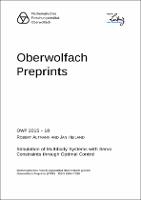| dc.contributor.author | Altmann, Robert | |
| dc.contributor.author | Heiland, Jan | |
| dc.date.accessioned | 2016-02-06T12:00:00Z | |
| dc.date.accessioned | 2016-10-05T14:14:03Z | |
| dc.date.available | 2016-02-06T12:00:00Z | |
| dc.date.available | 2016-10-05T14:14:03Z | |
| dc.date.issued | 2015 | |
| dc.identifier.uri | http://publications.mfo.de/handle/mfo/1105 | |
| dc.description | Research in Pairs 2014 | en_US |
| dc.description.abstract | We consider mechanical systems where the dynamics are partially constrained to prescribed trajectories. An example for such a system is a building crane with a load and the requirement that the load moves on a certain path. Modelling the system using Newton's second law- "The force acting on an object is equal to the mass of that object times its acceleration."- and enforcing the servo constraints directly leads to differential-algebraic equations (DAEs) of arbitrarily high index. Typically,the model equations are of index 5 which already poses high regularity conditions. Also, common approaches for the numerical time-integration will likely fail. If one relaxes the servo constraints and considers the system from an optimal control point of view, the strong regularity conditions vanish and the solution can be obtained by standard techniques. By means of a spring-mass system, we illustrate the theoretical and expected numerical difficulties. We show how the formulation of the problem in an optimal control context works and address the solvability of the optimal control system. We discuss that the problematic DAE behavior is still inherent in the optimal control system and show how its evidences depend on the regularization parameters of the optimization. | en_US |
| dc.language.iso | en | en_US |
| dc.publisher | Mathematisches Forschungsinstitut Oberwolfach | en_US |
| dc.relation.ispartofseries | Oberwolfach Preprints;2015,18 | |
| dc.subject | servo constraints | en_US |
| dc.subject | inverse dynamics | en_US |
| dc.subject | high-index DAEs | en_US |
| dc.subject | optimal control | en_US |
| dc.subject | underactuated mechanical systems | en_US |
| dc.title | Simulation of Multibody Systems with Servo Constraints through Optimal Control | en_US |
| dc.type | Preprint | en_US |
| dc.rights.license | Dieses Dokument darf im Rahmen von § 53 UrhG zum eigenen Gebrauch kostenfrei heruntergeladen, gelesen, gespeichert und ausgedruckt, aber nicht im Internet bereitgestellt oder an Außenstehende weitergegeben werden. | de |
| dc.rights.license | This document may be downloaded, read, stored and printed for your own use within the limits of § 53 UrhG but it may not be distributed via the internet or passed on to external parties. | en |
| dc.identifier.doi | 10.14760/OWP-2015-18 | |
| local.scientificprogram | Research in Pairs 2014 | |
| local.series.id | OWP-2015-18 | |
| local.subject.msc | 70 | |
| local.subject.msc | 65 | |
| dc.identifier.urn | urn:nbn:de:101:1-201602053940 | |
| dc.identifier.ppn | 1653734655 | |

